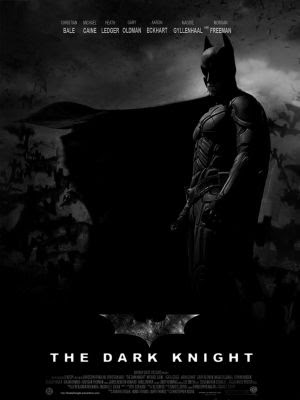 I saw The Dark Knight as early as last Thursday. But there was an embargo on reviews. And anyone who knows me knows how much I hate the idea of embargoes, unless it is on an exclusive. When a bunch of 20 or more journalists, bloggers and reviewers attend the screening, and there is an embargo, what purpose does it serve? Someone somewhere is going to post something online, and the rest of us would be screwed. Embargoes on something that's not an exclusive is just plain stupid.
I saw The Dark Knight as early as last Thursday. But there was an embargo on reviews. And anyone who knows me knows how much I hate the idea of embargoes, unless it is on an exclusive. When a bunch of 20 or more journalists, bloggers and reviewers attend the screening, and there is an embargo, what purpose does it serve? Someone somewhere is going to post something online, and the rest of us would be screwed. Embargoes on something that's not an exclusive is just plain stupid.
And sure enough, while I obediently observed the embargo, two idiots posted their reviews online almost right away. So much for the fucking embargo.
Having waited for so long to write this, I've kind of lost steam now. But I can say that whatever I had gleaned from the trailers before this, none of it comes close to the actual final product. I had little confidence in this sequel, partly because of the trailer, and partly because early reviews had mentioned that this was more action and less introspection. And from the trailer, I had felt Heath Ledger's Joker was no different than Jack Nicholson's, right down to the manic laughter.
But having seen the actual film, I take it all back.
Christopher Nolan has done the seemingly almost impossible, given us a sequel that builds upon the first film, builds upon the characters, and gave Gotham City a tangible place in the real world by linking it to Hong Kong. This is no longer a purely fictional world, but something much closer to home, which is probably why The Dark Knight feels extra disturbing. Tim Burton's version was set in a purely fantastical place, therefore rendering the whole affair a whimsical spectacle, and we watch it, distanced and detached, as purely a spectacle. Nolan's sequel cannot be removed from us simply because being rooted now in the real world, the issues it addresses become far more immediate than we could imagine from something of a comicbook origin.
The nature of hero and villain, good and evil, is explored through a glass darkly, the mirror images of both being far more conclusive in Nolan's treatment of the subject than any graphic novel has thus far done, the closest being Arkham Asylum, but which dealt the same cards in a different order. Then, for Nolan, there's also the idea of what a hero is in a society on the brink of anarchy, and he questions the very essence of human nature.
But the most interesting thing I find is the film's version of The Joker. Not only did Heath Ledger give a monumental performance, presenting us a Joker like we've never seen before this (and with a gloriously ingenious introduction to him involving a pencil), The Joker of this film takes on a whole different purpose altogether, removed from its comicbook mentality and disregarding the idea of him as merely a villain. This Joker appears seemingly out of nowhere, with no clear purpose or motive, origin unknown. He is the very basic idea of evil, if you want to call it that, the other end of the scale, one-part of a dual concept that is meaningless without its counterpart. That this evil simply exists is enough for the film, that it's as much a symbol as Batman is, that its genesis is untraceable, is the symptom of its role as metaphor, idea, representation. He is the catalyst for the anarchy that threatens to swallow an entire city, and the fact that his origin is ever-changing in the tales that come right out of his own mouth, only makes him ever more the disembodied.
All the action is great, and Nolan has improved on the last film even in this aspect, giving us sequences that are better shot and more controlled. Exciting as they are, it is what's brewing beneath and then spilling over the top that makes this more than just a superhero movie.
Tuesday, July 15, 2008
The Darkest Of Nights
Posted by
Allan Koay 郭少樺
at
9:45 PM
![]()
Labels: Reviews and views
Subscribe to:
Comment Feed (RSS)
COPYRIGHT POLICY: It's simple: Steal my stuff and I'll kick you in the nuts




|